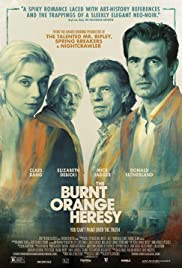
THE BURNT ORANGE HERESY
US, 2019, 95 minutes, Colour.
Claes Bang, Elizabeth Debicki, Mick Jagger, Donald Sutherland.
Directed by Giuseppe Capotondi.
All is not well in the art world. We are drawn into the world of art critics, of the world of painters, of the world of art dealers. It is also a world of forgeries and frauds – and leading to violence.
A character remarks that the title, The Burnt Orange heresy sounds rather pretentious. It is – but it is used with some ironyas a title for a painting which does not exist, then does exist but is a fraud.
The film is something of a cinema portrait of an art critic. His name is James Figueras and is played by the Danish actor with impeccable pronunciation and articulation, Claes Bang. (Interestingly, and coincidentally, Claes Bang appeared immediately afterwards in another film about art and forgery, The Last Vermeer, set in postwar Holland, where he is an investigator into a case where Nazi leader Herman Goering bought a Vermeer from Dutch artist.).
Perhaps we should be suspicious right from the start when James is rehearsing a lecture that he is to give while he exercises, gets dressed for work – and then the intercutting of the actual talk to an audience of mainly older women, explaining a painting, the artist painting in a concentration camp, his fate, that of his sister, the audience rapt, swayed by his persuasion. Also in the audience is a young woman, Berenice (Elizabeth Debicki), very attentive, talking with James and immediately beginning a sexual liaison with him.
She has her own story, masking what really happened to her, gradually revealed.
But, there is more in the art world. The couple are invited to the house of an art dealer, an interesting cameo from Mick Jagger at a vigorous 75. James wants to interview a celebrated artist, write a book, to do catalogue of his art collection.
The famous painter is played by Donald Sutherland, always a welcome screen presence. The artist has a reputation, a long story, confiding in Berenice, tantalising James about the possibilities.
The film takes on quite a melodramatic turn as it progresses, twists in the possibilities for James’s career, and some unexpected violence, shocking in its way.
Audiences need to be attentive to the interplay of the characters, their playing each other, the consequences of fraud and the thwarting of ambitions.
All is not well in the art world.
1. The title? The tone? The false painting? Deliberately pretentious title?
2. The art world, in the United States, in England, in Italy? The locations, the mansion and lake, countryside, the interiors? The contrast with the art world, offices, exhibitions, studios? The musical score?
3. Deception in the art world? Ambitions, frauds, forgeries – and violence and murder?
4. The portrait study of James Figueras? The presence of Claes Bang? The opening, exercise and dressing, rehearsing his speech, intercutting with the performance, the audience, the visuals of the painting, Berenice present and watching? The audience, listening to his telling the story from the concentration camp, the portrait, the evil symbol of flies, the desperate sister? And then the revelation of the truth about his painting it, the gullibility of audiences? His saying beware of critics?
5. Berenice, present, talking with James, the immediate sexual encounter, staying with him, the invitation by Cassidy? The gradual revelation of her story, her mask, from south of Duluth, teacher, confiding in Jerome, her leaving, playing around? Her relationship with James, love, sexuality, interest? Sharing with him? Discussions with Jerome, the bond between them? Her concern about James, the pills, his deals with Cassidy, the camera and photographing the paintings, the discovery of no paintings, her criticisms of James? His anger, trying to drown her, the discussion, his hitting her, disposing of her body in the Lake?
6. Cassidy, the presence of Mick Jagger, his style, dealing, unscrupulous, using James, the party, the later meetings? The exhibition? Whether Cassidy knew what had happened on not? His tantalising James?
7. Jerome, his career, reputation, meeting with James and Berenice? The discussions, on the boat, the walks? His story, his mask, confiding in Berenice? The discussion with James about heritage and legacy? The burning of all his paintings? His feeling of freedom, imagining his paintings, the colour of blue, the swimming pool? The meal, going to studio, the vacant canvases?
8. James, his reaction to the truth, upset, his plans? His returning, taking the signed canvas, the letters? Setting fire to the studio?
9. The aftermath, his writing the book, signing the books, the exhibition, The Burnt Orange Heresy? Cassidy noting the fingermark, Berenice and her touching the painting and challenging James?
10. The letter from Berenice with the dead flies?
11. The irony of Jerome, his painting of Berenice in blue, signing it, at her family’s home?
12. The sudden ending, leaving it to the audience to speculate?